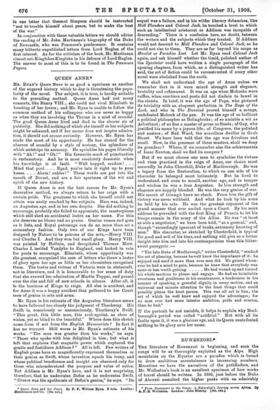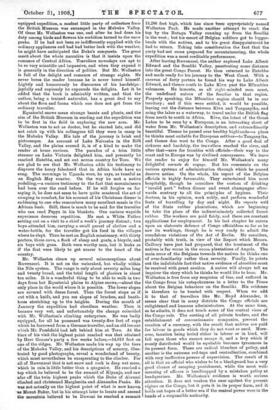RUWENZORI.* THE literature of Ruwenzori is beginning, and soon the
range will be as thoroughly exploited as the Alps. High mountains on the Equator are a paradox which is bound to draw ambitious mountaineers in increasing numbers. Meantime we have the narratives of the pathfinders, and Mr. Wollaston's book is an excellent specimen of how works of travel should be written. In 1906, just before the Duke of Abruzzi assaulted the higher peaks with an admirably
• From Ruteensort to the Congo: a Naturalist's /gurney across Africa. By A. F. B. Wollaston, London John Murray. [15s. nsal
equipped expedition, a .modest little party of collectors from the British Museum was encamped in the Mubuku Valley. Of these Mr. Wollaston was one, and after he had done his duty among birds and flowers his ambition turned to the snow peaks. If he had not been so indifferently supplied with the ordinary appliances and had had better luck with the weather, he might have anticipated the Duke's conquests. The great merit about the whole narrative is that it insists upon the romance of Central Africa. Travellers nowadays are apt to be so very scientific and impassive, and when they expand it is generally in the direction of politics. But Mr. Wollaston is full of the delight and romance of strange sights. He never bores the reader because he is never bored himself. Lightly and humorously he discourses of his hardships joyfully and copiously be expounds the delights. Let it be added that the book is admirably written, and that the author, being a trained naturalist, has a great deal to say about the flora and fauna which one does not get from the ordinary traveller.
Equatorial snows mean strange beasts and plants, and the aim of the British Museum in sending out the expedition was to be first in the field in exploring the new area. Mr. Wollaston was to act as doctor, but he started late, and did not catch up with his colleagues till they• were in camp in the Mubuku Valley. His tale of the journey is brisk an4 picturesque. An account of Lake Naivasha in the Rift Valley, and the plains around it, is of a kind to make the reader at home envious. The paradox of a trim little steamer on Lake Victoria delighted him, and presently he reached Entebbe, and set out across country for Toro. We are glad to see that Mr. Wollaston adds his testimony to disprove the hoary falsehood that in Africa birds have no song. The mornings in Uganda were, he says, as tuneful as an English May sunrise. On the way he met a native yodelling,—a curious testimony to the fact that mountaineers had been over the road before. If he will forgive us for saying it, he does not seem to have quite mastered the art of camping in comfort, for his account of his Christmas dinner is saddening to one who remembers many excellent meals in the African bush. Still, there is much to be said for the traveller who can read Pepys in his blankets. One curious wayside experience deserves repetition. He met a White Father setting out on a visit to a chief a week's journey distant ; two boys attended him, carrying a small parcel of clothes and a water-bottle, for the traveller got his food in the villages where be slept. Then he met an English missionary, with thirty porters, three cows, a flock of sheep and goats, a bicycle, and six boys with guns. Both were worthy men, but it looks as if the first were likely to get nearer to the heart of the country.
Mr. Wollaston clears up several misconceptions about Ruwenzori. It is not on the watershed, but wholly within the Nile system. The range is only about seventy miles long and twenty broad, and the total length of glaciers is about ten miles. It is a wonderful thing to be able to walk in two days from hot Equatorial plains to Alpine snows,—about the only place in the world where it is possible. The lower slopes are covered with dense forest. Thea the forest stops as if cut with a knife, and you see slopes of bracken, and heath. trees stretching up to the heights. During the month of January the expedition had cloudless weather. Then it became very wet, and unfortunately the change coincided with Mr. Wollaston's climbing enterprises. He was badly equipped, for all he possessed was twenty-five feet of rope which he borrowed from a German traveller, and an old ice-axe which Mr. Freshfield had left behind him at Toro. At the time of his visit the highest point reached was that attained by Herr Grauer's party a few weeks before,-14,813 feet on one of the ridges. Mr. Wollaston made his way up the tiers of the Mubuku Valley, and his descriptions of scenery, illus- trated by good photographs, reveal a wonderland of beauty, which must nevertheless be exasperating to the climber. For all of Ruwenzori that is not snow and rock is deep wet moss, which in rain is little better than a quagmire. He reached a top which he believed to be the summit of Kiyanja, and saw afar off the twin highest peaks which the Duke of Abruzzi climbed and christened Margherita and Alexandra Peaks. He PM not actually on the highest point of what is now known -as Mount Baker, but in his attempt later to locate and ascend the mountain believed to be Duwoni he reached a summit
15,286 feet high, which has since been appropriately named Wollaston Peak. He made another attempt to reach the top by the Butagn Valley running up' from the Semliki in the west ; but his escort of Belgian -soldiers got to logger- heads with the natives, and to his great disappointment he had to return. Taking into consideration the fact that the party had not come prepared for mountaineering, the whole expedition was a most creditable performance.
After leaving Ruwenzori, the author explored Lake Albert Edward and the Semliki Valley, penetrating some distance into the great Congo Forest. He then returned to Entebbe and made ready for his journey to the West Coast. With a caravan of forty porters he found his way to Lake Albert Edward, and thence south to Lake Kivu past the Mfumbiro volcanoes. He laments, as all right-minded men must, the undefined nature of the frontier in that region. Properly speaking, the Mfumbiro region should be in our territory ; and if this were settled, it would be possible, leaving out the distance between Kivu and Tanganyika, and using the lakes as a waterway, to travel under the British flag from north to south in'Africa. Kivu, the latest of the Great Lakes to be seen by a European, is an interesting sheet of water from Mr. Wollaston's description, and extraordinarily beautiful. Thence he passed over healthy highlands—a place he thinks most suitable for Enropean settlers—to Tanganyika, and thence due west to the Congo. After a good deal of sickness and hardship, the travellers reached the river, and after that--save for troubles with officials—their way to the coast and to Europe was by civilised conveyances. We leave the reader to enjoy for himself Mr. Wollaston's many delightful carnets de • sioyage. But his comments on the various systems of administration through which he passed deserve notice. On the whole, his report of the Belgian officials is highly favourable. They entertained him most hospitably, though he considers the custom of drinking "invalid port" before dinner and sweet champagne after- wards contrary to all the principles of hygiene. Their doctors, in his opinion, work nobly, and perform wonderful feats of travelling by day and night. He reports well of the State rubber plantations, which are beginning' to take the place of tbe indiscriminately collected forest rubber. The workers are paid fairly, and there are constant applications for employment. In his last chapter he enters upon an elaborate defence of Congo officialdom so far as he saw its workings, though he is very ready to admit the scandalous violations of the Act of Berlin. He considers, probably with truth, in view of the Report which Messrs. Cadbury have just had prepared, that the treatment of the natives is far worse in the cocoa plantations of Angola. The main error of the Belgians towards the natives he thinks mie of over-familiarity rather than severity. Finally, he points out the indubitable fact that native evidence of atrocities must be received with great caution. A native will always tell an inquirer the story which he thinks he would like to bear. Mr. Wollaston is free from any suspicion of bias, and suffered in the Congo from his outspokenness in a letter to the Times about the Belgian behaviour on the Semliki. His evidence is therefore to be treated with respect. When we add it to that of travellers like Mr. Boyd Alexander, it. seems clear that in many districts the Congo officials are. enlightened and humane administrators. At the same time, as he admits, it does not touch some of the central vices of the Congo rule. The ousting of all private traders, and the establishment of concessionnaire companies, prevent the creation of a currency, with the result that natives are paid for labour in goods which they do not want or need. More- over, taxation being levied either in labour or in kind, will fall upon those who cannot escape it, and a levy which if evenly distributed would be equitable becomes tyrannous in its present form. These are radical blunders of policy, and another is the extreme red-tape and centralisation, combined with very ineffective powers of supervision. The result of it all is that an official who wishes to be a blackguard has a very good chance of escaping punishment, while the most well- meaning of officers is handicapped by a mistaken policy at headquarters. Mr. Wollaston's' evidence is worth serious attention. It does not weaken the case- against the present regime on the Congo, but it puts it in its proper form, and it holds out hopes of a better era if the central power were in the hands of a responsible authority,















































 Previous page
Previous page